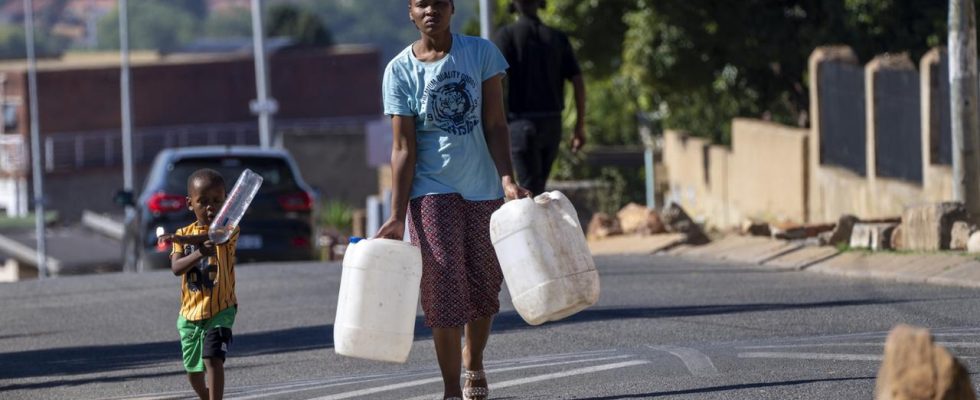Many people in Johannesburg have been suffering from a lack of water for weeks. This is not only due to the ongoing heat wave, but also to the dilapidated infrastructure. The administration of the metropolis is more or less helpless.
“Enough is enough,” people chanted at a demonstration in Johannesburg. You’ve had enough. No wonder. After all, half of the South African metropolis has been left high and dry for almost three weeks.
First, a lightning strike paralyzed the substation of an important pumping station. As soon as the system was repaired, the power kept failing and with it the water supply. Large storage spaces are empty and it takes time to fill them up. A heat wave exacerbates the problem. “We get water from friends who have a well. We go there with buckets, that helps us through the day,” says a woman.
Administration advises saving water
In order to alleviate the greatest need, 35 tank trucks are in use throughout the city. A drop in the ocean, nothing more. The administration recommends saving water: taking shorter showers, not watering the garden, and postponing washing your car. Advice that doesn’t go down well everywhere. “You can’t ask others to do anything if you don’t do your part,” says one man.
What this means is that the city has literally let its water supply go to waste. Large parts of the 12,400-kilometer-long pipeline system actually urgently need to be replaced. Almost half of the water that the major supplier “Rand Water” pumps to Johannesburg is lost.
Dilapidated Water infrastructure
Water is always leaking somewhere, sometimes even gushing out of leaky pipes. Sidewalks and roadways are wet, intersections are flooded because outdated pipes break, water storage tanks are leaking and repair crews can’t keep up with the work. “The system has been left to rot for ten years and we are now seeing the results,” says Dr. Ferrial Adam from the civil rights organization “WaterCan”. “The authorities can’t handle it.”
For many companies, the lack of water is becoming an existential problem. Small businesses in particular don’t know what to do because, for example, they wash cars, cook food or cut hair. Hospitals, retirement homes and schools are also among those who suffer.
Schools without water for days
Jan van Wyk is deputy director of the German International School in Johannesburg: twelve years, 1,050 students. There have been problems with the water before, but it has never been as bad as this time. “Who would have thought in a cosmopolitan city like Johannesburg that the water would stop flowing at some point? Last year we had an incident like this where there was no water for a day. The school then bought large tanks so that the Children at least have drinking water.” Now the toilets would be flushed by hand with buckets using water from the swimming pool.
No solution in sight
Kabelo Gwamanda has been mayor of Johannesburg for a year. When he took office, he promised to make “service delivery” the focus of his work, i.e. to improve public services. In the face of the water crisis, he takes refuge in helpless-sounding phrases: “Parts of our infrastructure need to be replaced, others repaired. There are various projects for this that are in different phases,” he explains.
So people in Johannesburg can’t seem to do much more than keep their fingers crossed that lightning won’t strike again during the next thunderstorm. Ultimately, the current crisis has shown that there is no safety net for drinking water supplies. Gugulethu Quma from the state water utility “Johannesburg Water” puts it this way: “We always have to hope for the best. The worst always happens to us, but we hope for the best.”
Stephan Ueberbach, ARD Johannesburg, tagesschau, March 22, 2024 6:09 p.m

